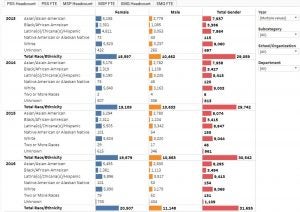To: All Faculty, Academic Appointees and Staff
Dear Colleagues:
This is a biannual reminder for all UCLA employees, including student employees, of the duty to provide appropriate accommodation for all individuals (including students and employees) with disabilities. This obligation exists for faculty and non-faculty academic personnel, including Teaching Assistants, as well as for all staff.
Accommodating Students with Disabilities
If you are a member of the faculty or non-faculty academic personnel or staff and a student indicates that they are in need of a disability-related academic accommodation, please promptly refer the student to the Center for Accessible Education (CAE) at (310) 825-1501 or via email at CAEintake@saonet.ucla.edu. More information can be found on the CAE website.
Accommodating Employees with Disabilities
If you are a UCLA employee (on campus or in UCLA Health) who supervises other UCLA employees and an employee indicates to you that they are in need of a disability-related accommodation, please promptly refer the employee to the following resources:
UCLA Campus: Employee Disability Management Services
Main Phone: (310) 794-6948
Email: RTWmail@irm.ucla.edu
UCLA Health: UCLA Health Disability Management
Main Phone: (310) 794-9873
Email: MCHRDM@mednet.ucla.edu
What is an “Accommodation” or “Reasonable Academic Accommodation” for Students Enrolled in UCLA Courses or in Campus Programs?
According to the Center for Accessible Education on Academic Accommodations:
“Reasonable accommodations are determined through an interactive process between the CAE, the student and instructional staff. It is axiomatic that reasonable accommodations must be disability-based. The academic adjustments and/or auxiliary aids, and/or modification or adjustment to practices, procedures or policies are so that a qualified student with a disability receives equal access to a course, program, service or activity.
Accommodations can be:
- Changes to a classroom environment or task that permit a student with a disability to participate in the educational process.
- Reasonable modifications to policies, practices or procedures that enable the student to participate in UCLA’s programs, including admissions, academics, online and distance education courses and housing.”
Reasonable accommodations are determined on a case-by-case basis. The above is not a fully inclusive list of all possible accommodations or modifications that may be evaluated during the interactive process.
According to the U.S. Department of Education, UCLA is required to “provide to students with disabilities appropriate educational services designed to meet the individual needs of such students to the same extent as the needs of students without disabilities are met.”
The University of California Office of the President (UCOP) has created briefing documents for faculty who “wish to understand the academic accommodations process legally required under federal and state laws, and UC policy”. The documents can be found on the UCOP Ethics, Compliance and Audit Services website. The documents include:
- Academic Accommodations – In Brief (PDF)
- Academic Accommodations: Roles and Responsibilities (PDF)
- Academic Accommodations: The Interactive Process (PDF)
- Academic Accommodations: Fundamental Alteration and Undue Burden (PDF)
- Academic Accommodations: Auxiliary Aids and Services and Class Recordings (PDF)
- Academic Accommodations: Service Animals and Emotional Support Animals (ESAs) in the Classroom (PDF)
What is an “Accommodation” or “Reasonable Accommodation” for Employees?
According to the Equal Employment Opportunity Commission:
“Reasonable accommodation is any change or adjustment to a job or work environment that permits a qualified applicant or employee with a disability to participate in the job application process, to perform the essential functions of a job or to enjoy benefits and privileges of employment equal to those enjoyed by employees without disabilities. For example, reasonable accommodation may include:
- acquiring or modifying equipment or devices,
- job restructuring,
- part-time or modified work schedules,
- reassignment to a vacant position,
- adjusting or modifying examinations, training materials or policies,
- providing readers and interpreters, and
- making the workplace readily accessible to and usable by people with disabilities.”
Reasonable accommodations are determined on a case-by-case basis. The above is not a fully inclusive list of all possible accommodations that may be evaluated during the interactive process.
Requests for Accommodation
Requests for accommodation do not have to be in writing and the words “reasonable accommodation” do not have to be used.
If a student or an employee shares with you that they have a disability/medical condition but does not request an accommodation, the best practice is to ask the person, “How can I/we help?”
Academic Accommodation Must Be Provided
Once a student has received a reasonable accommodation from the Center for Accessible Education, it is the obligation of the faculty member to honor that accommodation.
If the faculty member does not agree with the accommodation, it is appropriate for them to engage with the student and the Center for Accessible Education to seek an alternative form of accommodation. However, in the interim (and in the event that an alternative accommodation is not provided), the initial academic accommodation should remain provided.
Employee Accommodation Must Be Provided
Once a reasonable accommodation has been identified and implemented through the interactive process, it is the obligation of the supervisor to honor that accommodation.
If the supervisor or employee has concerns about the effectiveness of the accommodation, it is appropriate to engage with Disability Management to explore whether a modification or alternative accommodation would be effective. However, in the interim (and in the event that an alternative accommodation is not identified), the initial reasonable accommodation should be maintained.
We appreciate your cooperation in adhering to your mandatory duty to accommodate all people with disabilities at UCLA and for helping to strengthen civil rights protections for our entire community.
Please send questions and feedback to us at WeListen@equity.ucla.edu.
Sincerely,
Chandra Bhatnagar
Assistant Vice Chancellor for Civil Rights
Affirmative Action/Equal Employment Opportunity Officer
Yonit Kovnator
ADA/Section 504 Compliance Officer






